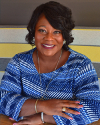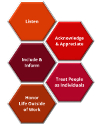
A Message from Ujima Donalson
Assistant Vice President,
Total Talent Management
In her annual address this autumn, President Cauce made a strong point that we at the University must do a better job of demonstrating our value to the community and across the state.
We in POD are no strangers to measuring success, whether through registration targets, course evaluations, or program assessments. However, when we communicate with leaders and staff, we’re typically publicizing development opportunities or sharing tools, resources, and information, rather than trying to tell our story or showcase our value.
In my own way, I’d like to answer President Cauce’s call “to not only be the story makers, but also the story tellers.” Read More

Change is Hard! Five Steps to Make it Easier
Jean Smithson-Bell, Smithson-Bell Consulting
As my father often said, it’s not the changes in life that cause us our stress or distress, but our reaction to the changes that will determine their outcome, positively or negatively. What he meant is that we must control our reactions to the many changes that impact our lives if we are to manage them well.
There are two types of changes that occur in the workplace: changes that individuals initiate and changes that are introduced by others. Typically, the changes we initiate ourselves are easier for us to digest than those introduced by others.
Here are the steps I practice, both professionally and personally, to help me manage change.
Read More

No Pain, Just Gain (Even When You Make a Mistake)
Wallace Wilkins, Ph.D.
No one is perfect. Some of our decisions and actions result in less than we expected. Sometimes we make mistakes.
As long as you are growing and learning in your profession, errors are as much a part of living as successes. Learning to prevent mistakes is important. Equally important is how you mindfully handle your thoughts after a mistake. After an error, it is common to ask, “What happened?” It is less common to ask, “What happens next?”
For many people “what happens next” is to punish themselves mentally. After they err, they berate themselves. The tapes that they play in their heads are harsh and punitive. This creates unnecessary pain — and it may interfere with their ability to learn from the setback.
Read more

Navigating Your Team Toward a Common Vision
Helene Cho, Synergy Consulting and Training
In his famous 1963 speech, Martin Luther King, Jr. said “I have a dream.” He did not say “I have a strategic vision.” In creating an effective vision statement, the language you use matters.
Co-creating a vision for your team
Bottom lines, profitability, fundraising, and expense control are important of course, but they do not “move” people or generate passion. They are side effects of doing the “right” things: Treating your employees well, providing excellent customer service, building quality products and services, being the best at what you do. Read more

Cultivating a Culture of Care
Ujima Donalson, Assistant Vice President,
Total Talent Management
When I attended the CUPA-HR annual conference in 2017, a brief session on Cultivating a Culture of Care resonated with me. Although culture of care is a new term for many at the UW, it is a concept that I have embraced, particularly in the space of employee engagement and retention.
Shortly after the conference, I had the opportunity at a Tri-Campus Institute to lead an exercise that required HR professionals across the UW to network and brainstorm on a variety of topics, including culture of care. The ideas shared in that session resulted in a set of diagrams that illustrate best practices and key ideas in a number of areas related to employee engagement and development. Read more

Advancing Organizational Excellence
POD’s Guide to Workplace Competencies defines an array of competencies under individual, interpersonal, operational, leadership, and organizational excellence, and identifies classes, consulting services, and other offerings to help you or a team member develop in specific areas.
In particular to this issue of the Leading Edge, see the competencies Change and Resilience, Organizational Acumen, and Strategic Ability in the organizational excellence category.
|








